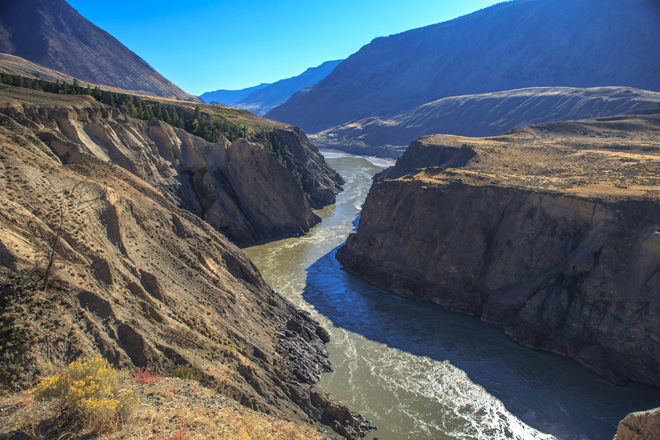The Fraser River is the most productive salmon producing watershed on the planet and one of the most biologically diverse in North America. It covers one quarter of British Columbia and has been the unceded, untreatied home to almost 100 Indigenous nations for over 12,000 years. Despite the watershed’s significance to communities, industry, and cultures, there is an ecological and economic crisis in BC’s interior forests. This summer we have seen this crisis surface again in catastrophic wildfires, with smoke from BC making its way across the continent. These fires, along with climate change, development, and other ecological impacts, are exacerbating the stresses on salmon and myriad terrestrial and riverine species, such as moose, caribou, and other species at risk, impacting cultural practices, recreational activities, and employment in local communities.

The Fraser Watershed Initiative’s Watershed Restoration Conference 2019 will be a two-day event at Thompson Rivers University Conference Centre in Kamloops, BC on April 24 and 25, 2019, with Premier Horgan scheduled to be in attendance.
The conference will bring together Indigenous leaders, industry experts, government representatives, academics, community officials, and conservationists from British Columbia and across North America who are interested in advancing watershed restoration and reconciliation with Indigenous nations throughout the watershed. The conference has been designed with Indigenous participation and insight to ensure traditional knowledge and Indigenous rights are integrated into all focus areas.
“Restoration is reconciliation” – Bev Sellers, former Councillor and Chief of the Xat’sull (Soda Creek) First Nation, Williams Lake, BC
Indigenous people have been guardians of the Fraser Watershed for thousands of years, maintaining ecosystem health for generations. Over the past 150 years, Indigenous people within the Fraser Watershed have been alienated from their territories and their traditional role as guardians.
As Bev Sellers, former councillor and chief of the Xat’sull First Nation states, “Restoration is reconciliation”.
Restoration of land and waterways within the Fraser Watershed is necessary for reconciliation. Reconciliation means, in part, the honourable resolution of land claims and the return of vast tracks of the Fraser Watershed to the sovereignty of Indigenous governments. The governments of Canada and British Columbia have committed to advancing reconciliation and pursuing government-to-government land useplanning as a vehicle to advance these negotiations.
“The Fraser Watershed Initiative has a broad and daring goal, to ‘heal and protect’ the entire Fraser River, its tributaries, and the land, wildlife and people it supports.” – Fin Donnelly, MP for Port Moody-Coquitlam and Chair of the Rivershed Society of BC
Fin Donnelly, MP for Port Moody-Coquitlam and chair of the Rivershed Society of BC, explains, “The Fraser Watershed Initiative has a broad and daring goal, to ‘heal and protect’ the entire Fraser River, its tributaries, and the land, wildlife, and people it supports. We are working toward a future where salmon flourish in rivers, communities have job opportunities that align with their values, and important ecological and cultural spaces are preserved throughout the Fraser Watershed.”
This will be achieved by bringing together Indigenous and non-Indigenous decision-makers, local community, and conservation and philanthropic leaders in a dialogue around watershed restoration, collaborative government-to-government land-use planning, fire-hardening of local communities, and conservation of critical habitats and cultural treasures.
Watershed Restoration Conference 2019 is the beginning of an exciting watershed-wide initiative that will conserve, protect, and restore the Fraser Watershed.
The conference will include presentations and panel discussions envisioning landscape-scale watershed restoration projects that offer the potential to:
• Advance Indigenous reconciliation
• Provide short-term employment relief
• Develop mid- and long-term sustainable employment strategies
• Aid in the recovery of forests and habitats of species at risk, including salmon, steelhead, caribou, etc.
• Fire-harden at-risk forest communities
• Make a contribution to climate change adaptation and mitigation, and
• Enable a future forest industry.
These presentations will be stepping stones to action, as now is the time to heal and protect the mighty Fraser River and its watersheds.
“We all want a healthy community and environment, but we are at a time where the cumulative impacts of our actions are threatening this desire,” says Jacinda Mack from the Secwepemc and Naxalk Nations. “We must come together and take action to protect these lands for future generations. The Fraser River is our lifeline, as it is for the salmon, eagles, bears, and all the other species we share this land with.”
Indigenous leaders, industry experts, government representatives, academics, community officials, and conservationists from British Columbia and across North America who are interested in advancing watershed restoration and reconciliation with Indigenous Nations throughout the watershed can register to attend, or learn more at restorationconference2019.com.
